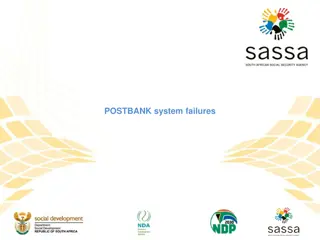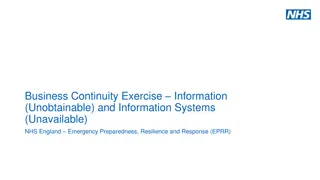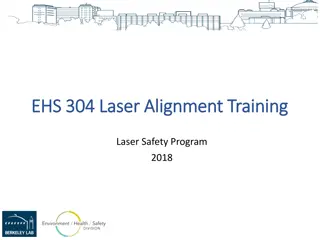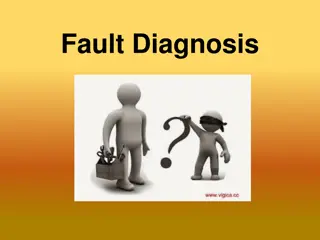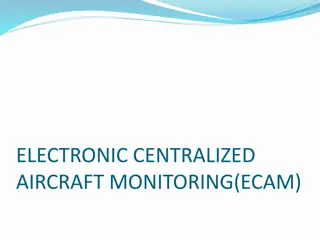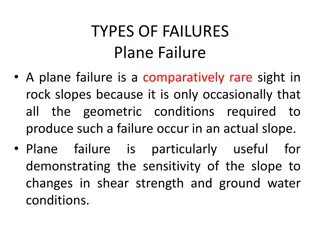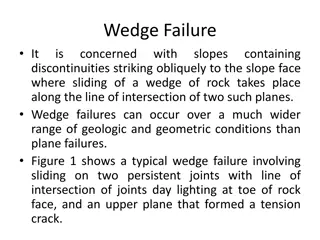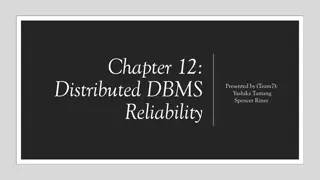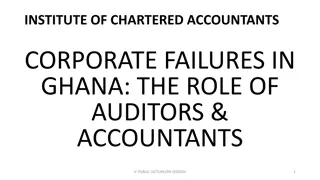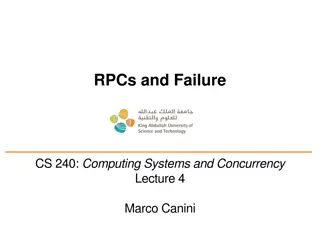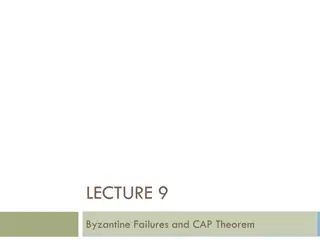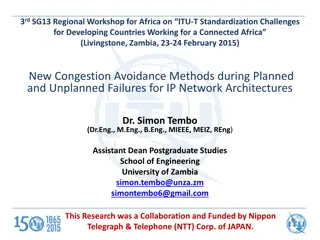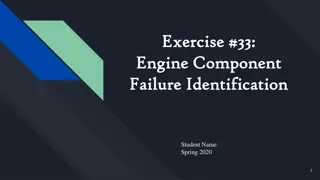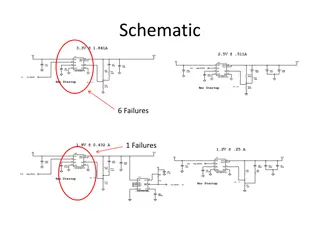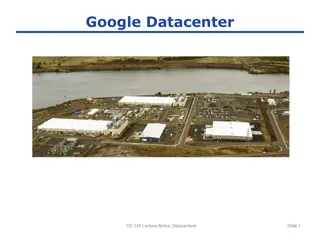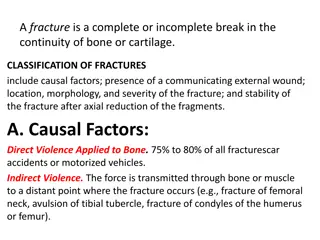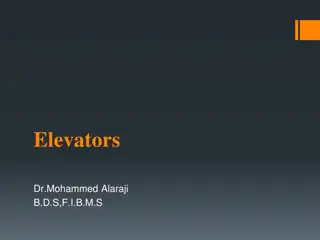Liver Transplant in India for treatment
Liver is the largest gland in our body, and an important metabolic organ which carries out many essential biological functions. The liver is a wedge-shaped, reddish-brown in color with two lobes of different size and shape. The approximate weight of a human liver is 1.5 kilograms. It is in the upper
5 views • 2 slides
Main Failures Faced by the Reserve Bank of India
The Reserve Bank of India has encountered several challenges including lack of adjustment in the money market, absence of uniformity in interest rates, inadequate bill market development, insufficiency of agricultural credit availability, lack of banking facilities in rural areas, and instability in
2 views • 11 slides
Update on Postbank System Failures and Challenges in Social Grant Payments
The presentation outlines the recent system failures experienced by Postbank, affecting social grant payments. Funds were deducted from accounts but not reverted after failed withdrawals. Postbank has corrected most accounts manually, but some beneficiaries may still need assistance. Challenges incl
0 views • 8 slides
Understanding Over-Pressurized Filters in Jeep Reverse Plug and Kia/Hyundai Engine Recall
Learn about the risks of over-pressurized filters in Jeep Reverse Plug systems and the significant Kia/Hyundai engine recall affecting millions of vehicles due to potential engine failures. Explore the connection between oil pressure issues, engine machining errors, and the importance of using compa
3 views • 14 slides
Business Continuity Exercise Information and NHS England Emergency Preparedness
The content focuses on a business continuity exercise related to NHS England Emergency Preparedness, emphasizing the importance of evaluating and enhancing business continuity plans. It covers elements of business continuity management, exercise objectives, ground rules, scenario background, and res
3 views • 16 slides
Overview of Distributed Systems: Characteristics, Classification, Computation, Communication, and Fault Models
Characterizing Distributed Systems: Multiple autonomous computers with CPUs, memory, storage, and I/O paths, interconnected geographically, shared state, global invariants. Classifying Distributed Systems: Based on synchrony, communication medium, fault models like crash and Byzantine failures. Comp
9 views • 126 slides
Understanding Electromigration Effects in IC Interconnect Lines
Background: As IC circuits advance, preventing failures like electromigration is crucial. Vacancies lead to potential failures in metal interconnects by causing macroscopic voids and hillocks. Explore the governing equations and physics interfaces behind the migration of vacancies in IC circuits. Im
0 views • 14 slides
Laser Alignment Training for Safety
This laser alignment training program focuses on exercises like wedge window alignment and beam splitter cube alignment to prevent laser eye injuries and control reflections. It covers techniques for safely setting up optics and aligning laser beams in a controlled environment.
0 views • 14 slides
Overcoming Failures: A Christian Perspective on Dealing with Setbacks
Discover how Christians can navigate failures by seeking repentance, accepting consequences, and pressing forward with faith. Learn from biblical examples like Judas, Peter, and Paul to embrace growth through failure and never give up in the face of challenges.
0 views • 18 slides
Calculus I Lecture #13: Volumes of Solids and Solids of Revolution
Exploring the concepts of finding volumes of solids using integrals, by slicing solid objects with parallel planes and calculating cross-sectional areas. Examples include calculating the volume of a pyramid and a curved wedge. The method of solids of revolution using the disk method is also discusse
0 views • 12 slides
Understanding System Reliability in Engineering
System Reliability in Science/Engineering involves understanding how products/systems work, as well as the ways they fail and the effects of failures. Reliability is the probability that a system will perform as expected under given conditions and play a crucial role in the design phase to mitigate
0 views • 19 slides
Understanding Fault Diagnosis in Mechanical and Electrical Systems
Explore the essential methods and techniques for fault diagnosis in mechanical and electrical systems in industrial settings. Learn to identify different types of faults, utilize fault-finding aids, and rectify issues promptly to prevent future failures. Discover industry-recognized fault diagnosing
2 views • 27 slides
Understanding Electronic Centralized Aircraft Monitoring (ECAM) Systems
Electronic Centralized Aircraft Monitoring (ECAM) is a vital system that collects data from sensors throughout the aircraft, processes it, and displays key information to pilots efficiently. The system is composed of various components like System Data Acquisition Concentrators (SDACs), Flight Warni
0 views • 6 slides
Understanding Plane Failures in Rock Slopes
Plane failures in rock slopes are rare but significant, indicating sensitivity to changes in shear strength and groundwater conditions. Geometrical conditions must be met for such failures to occur, including specific alignments and interactions between the sliding plane and slope face. Analysis inv
0 views • 22 slides
Understanding Journal Bearings in Mechanical Design
Journal bearings play a crucial role in mechanical design by utilizing lubrication to minimize friction and wear between rubbing surfaces. This article explores the concept of lubrication, the wedge effect in journal bearings, methods to create a viscous layer, and the parameters affecting generated
5 views • 40 slides
Understanding Wedge Failures in Geotechnical Engineering
Wedge failures in geotechnical engineering occur when slopes with discontinuities experience sliding along the line of intersection of two planes. This type of failure can happen under various geological and geometric conditions and involves specific criteria such as the dip of the intersecting plan
0 views • 13 slides
Distributed DBMS Reliability Concepts and Measures
Distributed DBMS reliability is crucial for ensuring continuous user request processing despite system failures. This chapter delves into fundamental definitions, fault classifications, and types of faults like hard and soft failures in distributed systems. Understanding reliability concepts helps i
0 views • 58 slides
Understanding Polly: A Resilience Framework for .NET Applications
A detailed overview of Polly, a resilience framework for .NET applications designed to help applications recover from failures and outages in external infrastructure. The framework provides building blocks like fluent API, retry strategies, timeouts, and code samples to ensure applications can grace
0 views • 20 slides
Corporate Failures in Ghana: The Role of Auditors & Accountants
Corporate failure in Ghana is characterized by discontinuation of company operations due to poor management, incompetence, and bad marketing strategies. This leads to an inability to generate sufficient revenue to cover business expenses. The lecture by Dr. Seddoh outlines the basic symptoms and cau
1 views • 32 slides
Understanding and Managing Success and Failures: A Comprehensive Guide
Explore the contrasting lives of Ralph Lauren and Victor Green, highlighting the importance of managing both success and failures. Learn about overcoming fears, identifying root causes of emotions, enhancing self-esteem, stress management techniques, and efficient traits for managing success and fai
0 views • 12 slides
Importance of Software Testing in Preventing Catastrophic Failures
Software testing is crucial in ensuring the reliability and safety of software systems, as highlighted by catastrophic failures such as the Ariane 5 rocket incident and the Therac-25 radiation therapy machine disasters. These examples underscore the importance of thorough testing in identifying and
1 views • 42 slides
Simple Machines Quiz - Test Your Knowledge on Wedge, Lever, Inclined Plane, and Screw!
Get ready for a fun and educational quiz on simple machines including the wedge, lever, inclined plane, and screw. Test your understanding of these fundamental concepts and sharpen your knowledge in a playful way.
0 views • 23 slides
Handling Failures in RPC Systems: Strategies and Considerations
Exploring the challenges and strategies for handling failures in RPC systems, this lecture delves into potential issues such as client crashes, packet loss, server failures, and network slowdowns. The At-Least-Once scheme is discussed as a simple method for managing failures and ensuring data integr
2 views • 22 slides
Overview of Fiscal Policy and Market Failures
Learn about fiscal policy decisions and their economic impact at different levels, understand the basics of a free enterprise system, and explore concepts like government expenditures, taxation, externalities, and potential market failures. Dive into categorizing goods based on rival consumption and
0 views • 39 slides
Byzantine Failures and CAP Theorem Overview
Byzantine failures refer to arbitrary patterns of failures where nodes exhibit inconsistent behavior. This lecture discusses Byzantine agreement and the challenges in reaching consensus with faulty nodes. It explores the minimum number of processes needed for consensus and extends the concepts to ge
1 views • 32 slides
New Congestion Avoidance Methods for IP Networks
This research presentation highlights the challenges of IP network failures, focusing on planned and unplanned scenarios. Dr. Simon Tembo discusses innovative methods to prevent congestion during failures, including a backup topology design for unplanned failures and a congestion avoidance approach
2 views • 40 slides
Fossorial Specimens: Mole and Caecilian Adaptations
Fossorial specimens, including the mole and caecilian, are uniquely adapted for subterranean burrowing. The mole, commonly known for its wedge-shaped head and reduced eyes, lives in tunnels and feeds on small worms and insects. On the other hand, the limbless caecilian, resembling a worm, thrives in
1 views • 25 slides
Causes of the Great Depression: Economic Turmoil and Bank Failures
The Great Depression was characterized by an extraordinary reversal from prosperity to misery in the American economy. Factors such as a sharp decline in demand for goods, bank failures, and the Federal Reserve System's actions contributed to the crisis. The failure to prevent bank failures and the
0 views • 19 slides
Engine Component Failure Identification in Spring 2020 - Common Tests and Real-world Examples
In this presentation, students are tasked with connecting common engine performance test results with real-world component failures. The slides include images and descriptions of various failures such as blown head gasket, worn piston rings, burned valves, damaged cylinder walls, and more. The goal
0 views • 13 slides
Electromagnetic Scattering by Wedge and Line Source Notes
In these notes from ECE 6341, Spring 2016, Prof. David R. Jackson covers the topic of scattering by a wedge and line source. The discussion includes boundary conditions, Bessel functions, integration techniques, and more, providing a thorough exploration of the electromagnetic phenomena involved.
0 views • 27 slides
Visual Insights into Schematic Failures and Bench Analysis
Explore detailed images showcasing schematic failures, analysis from schematics, web bench inputs, and re-compilation processes. Gain a deeper understanding of these visual representations in the context of technical failures and web bench activities.
0 views • 4 slides
Mach-Zehnder Interferometer for 2-D GRIN Profile Measurement
Mach-Zehnder Interferometer is a powerful tool used by the University of Rochester Gradient-Index Research Group for measuring 2-D Gradient-Index (GRIN) profiles. This instrument covers a wavelength range of 0.355 to 12 µm with high measurement accuracy. The sample preparation involves thin, parall
0 views • 6 slides
Handling Errors and Failures in Software Design and Implementation
Exploring the concepts of dealing with errors and failures in software development, focusing on assertions and exceptions. Discusses the importance of preventing complete failures, giving information about problems, and preventing harm when things go wrong. Emphasizes the significance of structuring
0 views • 37 slides
Overview of Datacenter Operations and Failures
The content discusses datacenter organization, frequent failures, and the prevalence of datacenters in modern computing. It details the typical first-year failures in a new datacenter and highlights the number of servers per datacenter and the shift towards datacenter-centric computing.
0 views • 10 slides
Single Firefighter Forcible Entry through Inward Swinging Door
Follow these steps for a single firefighter forcible entry through an inward swinging door: assess the door size and shock the door jamb, insert the adz end for mechanical advantage, use an axe as a wedge, create a gap using the butt of the axe, advance the halligan tool to force entry efficiently.
0 views • 6 slides
The LaPerm Cat: A Unique Feline Breed
The LaPerm cat is a distinctive breed known for its curly coat, originating from barn cats in Oregon in the 1980s due to a spontaneous mutation. It comes in both longhair and shorthair varieties, with all coat and eye colors accepted. This medium-sized cat has a modified wedge-shaped head, high chee
0 views • 22 slides
Understanding Fractures: Classification and Factors
A fracture is a break in bone continuity, classified by causal factors, presence of external wounds, location, morphology, severity, and stability post-reduction. Fracture causes include direct violence, indirect violence, bone diseases, and repeated stress. Fractures can be closed or open, with sev
0 views • 17 slides
Understanding Dental Elevators and Mechanical Principles of Usage
Dental elevators are specialized instruments used by dentists like Dr. Mohammed Alaraji, B.D.S, F.I.B.M.S, for tooth extraction procedures. They involve mechanical principles such as the lever, wedge, and wheel-and-axle principles. Elevators consist of parts like the handle, shank, and blade for eff
0 views • 21 slides
Comprehensive Guide to Failure Mode and Effect Analysis (FMEA)
Failure Mode and Effect Analysis (FMEA) is a crucial process that identifies potential failures in products or processes, evaluates their impact, and proposes actions to prevent or mitigate these failures. FMEA aims to prevent problems, improve product development, ensure regulatory compliance, and
0 views • 34 slides
Insights from Yugoslavian Economic Growth Model Analysis
This paper revisits socialist growth in Yugoslavia, focusing on model-based assessment of economic determinants and findings related to Total Factor Productivity (TFP) growth. The model decomposes output growth deviations, discussing factors like efficiency wedge, labor wedge, investment wedge, and
0 views • 12 slides


